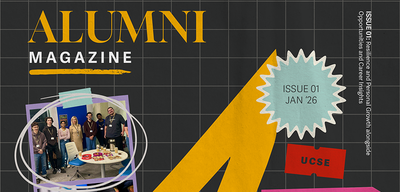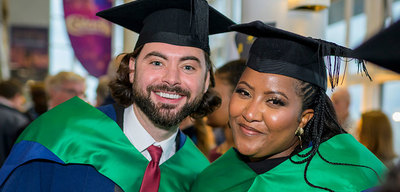Share On
HE Fees and Funding
Tuition fees
The amount of financial support provided to higher education students will depend on the programme you choose and if it is a full-time or part-time course. It will also depend whether you are a home, EU or an international student.
Fees and payment schedules
Information on fees and payment schedules can be found on our Policies, Procedures and Downloads page.
Additional costs
The University Centre South Essex provides an extensive range of classrooms and studios, hardware, software and technician support. A wide range of professional equipment is available for students’ use, making it possible to successfully follow the course of study without making additional significant personal investment in equipment - unless students choose to do so.
Whilst the University Centre tries to keep additional student costs to a minimum, there may be additional costs associated with your course. The cost of optional activities is not included in the tuition fee and students will need to meet this cost in addition to fees. A summary of the costs that students may need to budget for, while studying a course at the University Centre South Essex in the 2022-23 academic year are listed here.
Typically, at any university practice-based courses incur more costs than text-based subjects.
Most courses have some specialist material available for students to use, however students will need to budget for the cost of specialist materials, equipment, stationary and printing beyond that provided. This spend will be between £50–£300 per year depending on individual requirements.
Most course books and a wide range of magazines and journals are available in the library. Students do not need to have their own copies, but if they wish to, students should budget up to £200 over the course to buy them.
Specialist equipment is provided to cover essential learning, with access to computers and necessary software across the University Centre, however some students may choose to buy their own specialist equipment. These may include cameras, or computers and software. Budgets can range from £50–£2,000. Buying specialist equipment is best undertaken in consultation with academic and/or technical staff. The amount spent will depend on individual choices but this expenditure is not essential to pass any of our courses.
Students will receive a printer allowance for standard A4/A3 printing each Academic Year, some courses, for example Photography, may incur higher costs which are not included in the allowance (up to £500 based on previous student experience) when printing and framing images of professional standard for public presentation.
On Engineering courses students are required to bring their own Personal Protective Equipment (PPE).
Costs in the final year of study on a creative course are very likely to be higher than in earlier years as students bring together their final body of work and portfolio, students may need to budget between £200 and £1,000.
Final-year graduation shows are opportunities to present your final, independent project work to the public. Practice-based courses will typically incur higher costs. Depending on the specific nature of the final project students may need to budget between £20–£1,000.
Students on placement will normally incur additional transport costs dependent on the location of the placement. For students on BA (Hons) Counselling, students will required to pay a sum for 30 hours of personal therapy, a sum for clinical supervision, a sum for appropriate personal indemnity insurance, and a sum for required membership of an industry regulatory body. Students on placement may also be required to pay a sum for an enhanced Disclosure and Barring Service (DBS) check.
For most courses there will be the opportunity to attend field trips and off-site visits, for example to galleries, exhibitions, and studios, museums of relevance to the curriculum, relevant exhibitions or conferences, court visits etc. These are optional and are not required to pass the course. The nature of the costs vary from provisions for a packed-lunch to flight and accommodation costs for international field trips.* The amount spent would be based on location and number of trips taken, and typically range between £30 and £1500 across the duration of the course. Students attending theatre performances will normally be asked to pay for the cost of their ticket.
*For the Academic Year 2022-23 students on BA (Hons) Digital Animation, BA (Hons) Film & TV Production and BSc (Hons) Games Design will have a residential trip built into their third year studies, Covid and other unforeseen restrictions permitting.
Further information
Please speak to our HE Support team for more information about fees and advice on international fee-paying status.
Student Finance
You can find out all about the financial support you are entitled to from the government at the following address: www.gov.uk/student-finance.
Tuition Fee and Living Cost loans are available from Student Finance England. The tuition fee loan is paid directly to the university and covers the cost of the course. The living cost loan (also referred to as a student loan or maintenance loan) is usually paid in three instalments directly into your bank account to help cover living costs including accommodation, food and course materials.
You can use the student finance calculator to find out how much you will be able to get from the government.
Student Finance England also share up to date information via their Twitter and Facebook pages.
Applying for student finance
We have created the following document to help you understand more about the process of applying for student finance.
To be eligible for a tuition fee loan you must fulfil certain criteria in regards to:
- UK residency status
- The university or college you are studying at and the course you are taking
- Previous higher education study (first-time students)
Regulations relating to Higher Education study
Please see below for regulations relating to Higher Education study at University Centre South Essex.
Advice and guidance
Our higher education support team is on-hand to provide advice and guidance on issues relating to study costs and financial support, including hardship funding.
Further information
If you require assistance with your application or more information please contact HE Support HESupport@southessex.ac.uk
Prior to starting your course, it is advisable to work out if this is financially viable, especially if you plan to give up work, or will lose benefits that you were previously eligible for. Before you do this you are advised to speak to the benefits agency to see how your benefits may be affected by enrolling onto a higher education course.
University Centre South Essex works with The Money Charity to assist students in understanding and managing their budgets. We recommend that you use their budget builder to help you prepare for university.
You can find the online tool here.
Student Finance England Contact Information
Student Finance England
PO Box 210
Darlington DL1 9HJ
Telephone: 0300 100 0607
Website: Contact Student Finance England - GOV.UK
NGT text relay (if you cannot hear or speak on the phone): 18001 then 0300 100 0607




